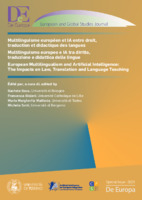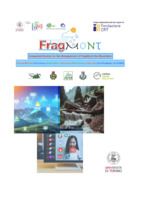Sfoglia documenti (2 in totale)
Sort by:
Multilinguisme européen et IA entre droit, traduction et didactique des langues
Multilinguismo europeo e IA tra diritto, traduzione e didattica delle lingue
European Multilingualism and Artificial Intelligence: The Impacts on Law, Translation and Language Teaching
Ce numéro spécial de la revue De Europa recueille les contributions interdisciplinaires et multilingues issues des travaux du groupe de recherche sur les droits et les variations linguistiques en Europe qui ont été entamées depuis 2020 pour le projet Artificial Intelligence for European Integration — AI4EI.
La première partie du livre a permis d’entamer des réflexions sur l’IA et le multilinguisme européen par rapport au droit, par exemple en abordant la question de la traduction juridique automatique ou de la terminologie juridique en relation à l’utilisation de l’IA.
La deuxième partie du livre rassemble des études concernant les expérimentations pédagogiques menées par les universités qui ont participé au projet. À ce sujet, la nécessité de stimuler une posture critique vis-à-vis des nouvelles technologies se révèle fondamentale pour une intégration réussie des dispositifs basés sur l’intelligence artificielle dans la pédagogie universitaire.
Il volume fa parte del progetto AI4EI (https://www.jmcoe.unito.it/)
La première partie du livre a permis d’entamer des réflexions sur l’IA et le multilinguisme européen par rapport au droit, par exemple en abordant la question de la traduction juridique automatique ou de la terminologie juridique en relation à l’utilisation de l’IA.
La deuxième partie du livre rassemble des études concernant les expérimentations pédagogiques menées par les universités qui ont participé au projet. À ce sujet, la nécessité de stimuler une posture critique vis-à-vis des nouvelles technologies se révèle fondamentale pour une intégration réussie des dispositifs basés sur l’intelligence artificielle dans la pédagogie universitaire.
Il volume fa parte del progetto AI4EI (https://www.jmcoe.unito.it/)
FragMont – Integrated System for the Management of the Fragility in the Mountains
This publication introduces the FragMont Project (published in the Italian version in this site), an integrated system for managing mountain fragility. Developed by a research team from the University of Turin in collaboration with the Department of Medical Sciences, the NatRisk Interdepartmental Center, CNR-IRPI, and enriched by the innovative integration of components developed with ChatGPT, the project also involves national and regional authorities, as well as the municipalities of Alagna Valsesia and Moncucco Torinese.
The project aims to establish a connection between the costs of prevention and the losses of ecosystem services in mountainous areas prone to natural disasters. It incorporates diverse perspectives, including various types of fragility and the challenges associated with the isolation of vulnerable individuals.
The primary outcome is the development of an integrated management system designed to mitigate mountain fragility. This system supports prevention efforts, coordinates restoration operations, and provides care, all while evaluating the costs and benefits of risk reduction.
FragMont has also developed guidelines for municipalities facing isolation scenarios, offering insights into the costs and benefits of preventive and assistance measures. The utilization of ChatGPT in this phase allowed for an in-depth exploration and an expanded view of potential preventive strategies, contributing to a richer, more nuanced understanding of the implications of each measure.
The project's results can potentially be applied to other regions with similar geographical features, characterized by mountainous tourist destinations and aging, fragile populations. The publication outlines the project’s phases, which encompass the analysis of environmental and population fragility, the development of open-source technologies for territorial monitoring and telemedicine, the study of monitored sites and preventive measures, as well as an economic analysis of the benefits and costs associated with assistance and prevention actions.


